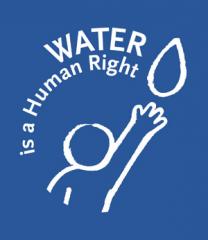How to Disappoint 1.9 Million Citizens in a Few Minutes
For one moment, imagine that you are the Vice President of the European Commission. Citizens all around Europe have collected signatures demanding you to recognize the Human Right to Water and Sanitation in the European Union. This first ever European Citizen’s Initiative to be successful gained support from 1.9 million people. You had three months to discuss with your colleagues what to do about it. You start the press conference, smile to the cameras and speak for a few minutes. You announce that you say yes to the petition but you are aware that you are offering nothing. Finally, you leave the room.
 For one moment, imagine that you are the Vice President of the European Commission. Citizens all around Europe have collected signatures demanding you to recognize the Human Right to Water and Sanitation in the European Union. This first ever European Citizen’s Initiative to be successful gained support from 1.9 million people. You had three months to discuss with your colleagues what to do about it. You start the press conference, smile to the cameras and speak for a few minutes. You announce that you say yes to the petition but you are aware that you are offering nothing. Finally, you leave the room.
For one moment, imagine that you are the Vice President of the European Commission. Citizens all around Europe have collected signatures demanding you to recognize the Human Right to Water and Sanitation in the European Union. This first ever European Citizen’s Initiative to be successful gained support from 1.9 million people. You had three months to discuss with your colleagues what to do about it. You start the press conference, smile to the cameras and speak for a few minutes. You announce that you say yes to the petition but you are aware that you are offering nothing. Finally, you leave the room.
Now imagine that the multinational company that manages water in your city cut off your water supply because you can’t afford to pay the bills. Or imagine that your municipal water supply is about to be privatized. Or maybe you were even involved in the signature collection and invested a lot of your time and efforts on it.
How would you feel in each situation? March 22nd is World Water Day, a good moment to reflect about the huge gap created this week between the announcement of the European Commission and the expectancies of 1.9 million European citizens on the right to water.
But, what is a European Citizen’s Initiative?
The European Citizen’s Initiative is a new democratic tool that tries to allow EU citizens to participate directly in the development of EU policies by calling on the European Commission to make a legislative proposal. You “just” need to collect one million signatures coming from at least 7 member states, following a really complicated set of rules and procedures.
And the Right to Water Initiative did it. Nearly 1.9 million signatures were collected with three basic demands: the legal requirement by EU institutions and Member States to ensure that all inhabitants enjoy the right to water and sanitation, a commitment that water supply and management will not be privatized and a commitment to increase EU efforts to achieve universal access to water and sanitation. These were three clear demands that had nearly no echo in the Commission’s answer.
The European Commission acknowledged the importance of the Human Right to Water and Sanitation and confirmed water as a public good. Which is good, but just words. They didn’t propose any legislation to recognize this right, just a compilation of already ongoing actions plus the announcement of a public consultation on the drinking water directive whose outcomes will not be binding. On the positive side, they committed to promote universal access to water and sanitation in its development policies, including the promotion of public-public partnerships. And that’s a step in the right direction.
But citizens had asked to exclude water and sanitation from what they call “internal market rules,” that is, privatization and liberalization. And the Commission did nothing. Water was excluded temporally, due to strong public opposition, from the last internal market legislation. But the Commission didn’t explicitly exclude these services from the ongoing trade negotiations, such as the Transatlantic Trade and Investment Partnership (TTIP or TAFTA) with the U.S. or the Comprehensive Economic and Trade Agreement (CETA) with Canada.
The European Water Movement, of which Food & Water Europe is part, stated it quite clearly: this decision implies a bad precedent for this new mechanism of public participation.
Water privatization is still a very concrete menace in many European countries, with the European Commission itself one of the main drivers. As part of the Troika (the tripartite committee composed by the European Commission, the European Central Bank and the International Monetary Fund), they are pushing for water privatization in Greece and Portugal, while evidence from public auditing bodies confirms that privatization is detrimental both for local authorities and ordinary citizens. And the reality on the ground shows that when families can’t afford to pay their bills, they are being deprived of access to water by private companies, as happened recently in Jerez, Spain.
Citizens are mobilizing across Europe. Millions of Italians voted against water privatization and local referendums took place in major cities like Madrid and Berlin. Right now citizens of Alcazar de San Juan, Spain, are voting on a popular referendum about the privatization of their water supply. Thessaloniki, in Greece, will vote on May 18. And other cities, like Puerto de Santa Maria, also in Spain, are now mobilized for the same reasons.
Water should be a commons, not a commodity. We must close the gap between citizen’s expectations and EU decisions. We need to keep reminding our politicians of the importance of the right to water before the elections for the European Parliament. And we need to keep it in mind also in the World Water Day.


